The historic friendship between the two countries has been further strengthened and deepened by the high-level diplomatic meeting of Maldives President Mohamed Muizzo with Indian Prime Minister Narendra Modi in October 2024. But the India-Maldives meeting in New Delhi last week was a particularly important turning point for both as it sought to end the recent bitterness between the two, but also to pave the way for the future of their relations.
This article will explore the background to this meeting, the likely key outcomes of the talks, and the broader context of Maldives-India relations in the areas of economics, defence and climate change. It will also consider what role this meeting will play in determining the future of South Asian geopolitics.
This article will explore the background to this meeting, the likely key outcomes of the talks, and the broader context of Maldives-India relations in the areas of economics, defence and climate change. It will also consider what role this meeting will play in determining the future of South Asian geopolitics.
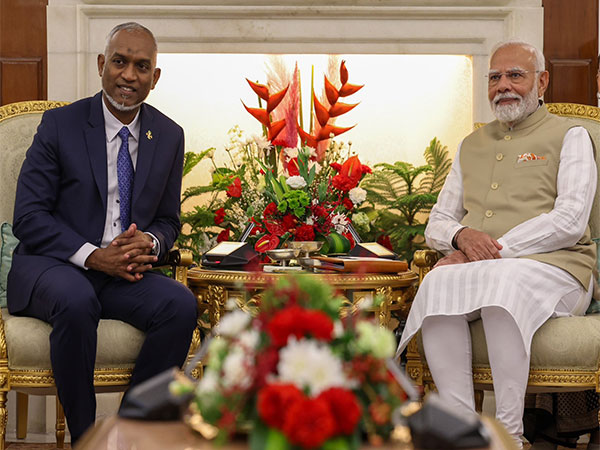
History of India-Maldives Relations
Maldives and India share deep ties at almost all levels, from cultural, economic to strategic perspectives. Both are neighbouring countries located in the Indian Ocean, which have historically considered each other as important partners. Close cooperation with its neighbouring countries, including Maldives, is Bhutan’s “neighbourhood first” policy. In contrast, Maldives has been dependent on India for economic assistance as well as joint security cooperation and disaster relief.
Over the years, Maldives has relied on India’s help at critical times. For instance, in 1988, when Maldives was facing a coup attempt, India saved the situation by taking prompt action under ‘Operation Cactus’. Since then, India has remained an important ally of Maldives, supplying assistance in the form of infrastructure development, healthcare, education and trade.
However, relations have not always been smooth. Relations between India and Maldives soured during the last years of President Abdulla Yameen’s tenure, when Yameen’s ‘pro-China’ stance and especially the India Out campaign led to a decline in India’s influence in the Maldives. However, these tensions began to ease in the early 21st century after President Ibrahim Solih came to power, who gave priority to restoring bilateral relations with India. However, like his administration, India too seeks to pursue a ‘Maldives First’ policy to further improve relations with the Maldives.
Over the years, Maldives has relied on India’s help at critical times. For instance, in 1988, when Maldives was facing a coup attempt, India saved the situation by taking prompt action under ‘Operation Cactus’. Since then, India has remained an important ally of Maldives, supplying assistance in the form of infrastructure development, healthcare, education and trade.
However, relations have not always been smooth. Relations between India and Maldives soured during the last years of President Abdulla Yameen’s tenure, when Yameen’s ‘pro-China’ stance and especially the India Out campaign led to a decline in India’s influence in the Maldives. However, these tensions began to ease in the early 21st century after President Ibrahim Solih came to power, who gave priority to restoring bilateral relations with India. However, like his administration, India too seeks to pursue a ‘Maldives First’ policy to further improve relations with the Maldives.
Key Point of the Meeting
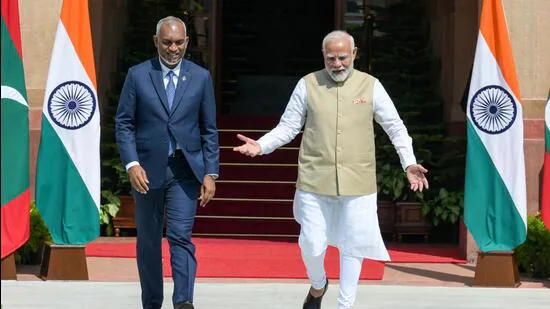
Economic and Financial Cooperation Assistance
Economic cooperation was one of the main themes of the meeting. He thanked the Indian government for its ‘continued financial support, particularly in the form of a rollover of $100 million of treasury bills’. This extension gave Maldives a much-needed financial relief at a time when the island nation’s economy is heavily dependent on tourist inflows. India also extended another special export quota of essential commodities to Maldives for another year to guarantee continuity of supplies of goods to its neighbour.
The two countries discussed the development of trade and investment, and Muizzo said India should support Maldives’ National Development Plan, which aims to transform the country into a developed country by 2040. This 20-year plan will include infrastructure development, diversification of the economy from tourism and the creation of a sustainable economic model. However, India’s continued investment and technical assistance will be essential if Maldives is to achieve this ambitious goal.
Separately, the two sides also agreed to consider new areas of economic cooperation, particularly in the agriculture and fisheries sectors, which are important to the Maldives economy. Both leaders acknowledged that there is a need to further diversify trade as trade is not a source of resilience.
The two countries discussed the development of trade and investment, and Muizzo said India should support Maldives’ National Development Plan, which aims to transform the country into a developed country by 2040. This 20-year plan will include infrastructure development, diversification of the economy from tourism and the creation of a sustainable economic model. However, India’s continued investment and technical assistance will be essential if Maldives is to achieve this ambitious goal.
Separately, the two sides also agreed to consider new areas of economic cooperation, particularly in the agriculture and fisheries sectors, which are important to the Maldives economy. Both leaders acknowledged that there is a need to further diversify trade as trade is not a source of resilience.
Tourism and Digital Payments
With 28% of its GDP dependent on tourism, the Maldives is a challenge for the developed world. The country’s pristine beaches and luxurious resorts attract tourists from across the world, including a growing number of tourists from India. At the meeting, PM Modi also launched RuPay cards in Maldives, as the facility aims to make financial transactions more seamless for Indian tourists visiting Maldives. India’s move is also part of its initiative to globalise its digital payment infrastructure.
At a time when both countries are trying to expand their financial integration, the RuPay card system can be a case study for other South Asian countries looking for an easy financial transaction structure.
Security and Maritime Cooperation
The Maldives is geographically located in a key position in the Indian Ocean, where maintaining regional security is vital. The leaders also emphasised the importance of strengthening maritime cooperation to fight security challenges, including piracy, human trafficking and illegal fishing.
They also discussed expanding joint defence exercises as well as greater cooperation between the coast guards of the two countries. He said the Maldives will ensure that it does not have any foreign relations with any partner, including China, that impact India’s security interests. And Prime Minister Modi also assured the Maldives that India will continue to provide support to ensure the security of the region from external threats and to pursue technical cooperation to reduce threats to security in the Indian Ocean. But this commitment to regional stability is important not just for India and the Maldives but also for the broader Indo-Pacific region, which is increasingly under threat from growing geopolitical egos.
They also discussed expanding joint defence exercises as well as greater cooperation between the coast guards of the two countries. He said the Maldives will ensure that it does not have any foreign relations with any partner, including China, that impact India’s security interests. And Prime Minister Modi also assured the Maldives that India will continue to provide support to ensure the security of the region from external threats and to pursue technical cooperation to reduce threats to security in the Indian Ocean. But this commitment to regional stability is important not just for India and the Maldives but also for the broader Indo-Pacific region, which is increasingly under threat from growing geopolitical egos.
Climate Change and Sustainability
Given the magnitude of climate change, climate change is one of the biggest challenges facing the Maldives. It is a low-lying island nation, and is particularly vulnerable to rising sea levels and extreme weather events due to climate change. The leaders discussed how India will provide sustainable development assistance to the Maldives, and how they will work together to tackle climate change. Both noted that India has technical expertise in renewable energy, particularly the solar energy sector, which will be a key area of cooperation. The Maldives is also asking India to help the country in climate adaptation projects that ensure the protection of its coastal communities and fragile ecosystems. Since India is a leader in international climate agreements, this partnership is likely to be operationalized in joint efforts at global forums such as the United Nations and the International Solar Alliance.
Broader : Geopolitical and Strategic Implications
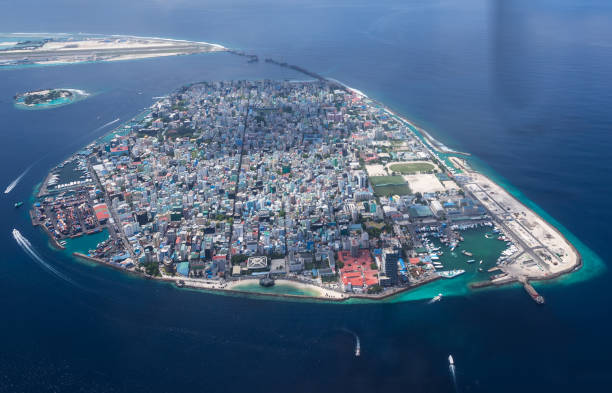
India and China are interested in the Maldives from the point of view of its strategic location in the Indian Ocean. In the decade since independence, the Maldives has walked a fine line with its two largest partners. The Maldives received intensive investment from China through the Belt and Road Initiative (BRI) through projects such as bridges, airports and housing developments. But there are also concerns about dependence on debt and China’s potential influence on Maldivian politics.
However, India on the other hand has always been providing development assistance at a much lower level of financial obligations. The Maldives abandoned its policy of neutrality towards India and China under Muizzo’s administration, which the President himself said would continue to follow an ‘independent, independent foreign policy’ to safeguard India’s security interests.
Maldives-India relations are seen as having undergone a significant reset at that meeting. Through a push to cooperate in various fields the two countries are giving a signal that they are trying to reduce the strategic competition that characterises much of the Indo-Pacific.
However, India on the other hand has always been providing development assistance at a much lower level of financial obligations. The Maldives abandoned its policy of neutrality towards India and China under Muizzo’s administration, which the President himself said would continue to follow an ‘independent, independent foreign policy’ to safeguard India’s security interests.
Maldives-India relations are seen as having undergone a significant reset at that meeting. Through a push to cooperate in various fields the two countries are giving a signal that they are trying to reduce the strategic competition that characterises much of the Indo-Pacific.
The “India Out” Campaign and Muizzu’s Approach
The nationalistic “India Out” campaign to reduce India’s military presence in the Maldives played some role in Muizzu’s election. India assured that President Muizzu’s administration did not intend to harm India’s security or its interests and yet the campaign was carried out. India also matters to him because the tiny Maldives has received crucial support from India in times of crisis, including during the Covid-19 pandemic, when India sent essential medical supplies and vaccines to the island nation.
China’s Role in the Maldives
The rivalry between major powers India and China for influence in the Indian Ocean is gaining momentum in the Maldives, where China’s clout is growing steadily. But the problem of Maldives’ debt to China could prove destabilising. But India has focused on diplomatic and defence cooperation, along with providing more permanent aid. That is why Muizzo’s meeting with Modi is in this context, an indication that Muizzo wants to balance his relations with China and India. Yet the strategic aspect is also beneficial for New Delhi: the Maldives is close to India, and its location in the Indian Ocean makes it a geopolitically important country. The meeting noted that China is an important economic partner for the Maldives, but its relationship with India also matters and the Maldives wants to improve ties, especially on security, trade and climate cooperation.
New beginning of India Maldives Relation
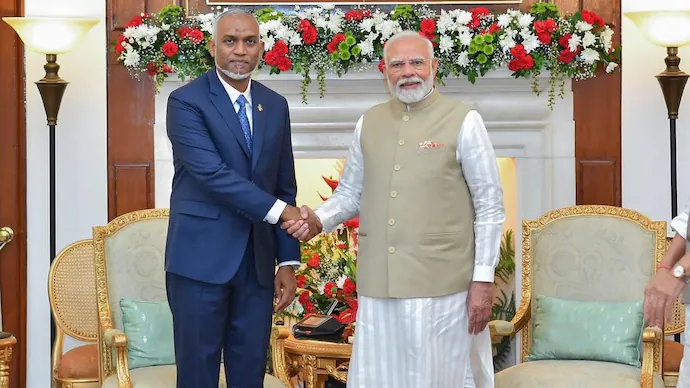
The high level talks of Maldives President Mohamed Muizzu and Indian Prime Minister Narendra Modi have laid the foundations for a fresh phase of cooperation between the two countries. The message of this meeting is one of mutual commitment to overcome past challenges and work to create stronger ties based on shared interests in areas of security, economic development and environmental sustainability.
This meeting comes as the Maldives grapples with balancing its proxy relationships with major power players like India and China that the islands insist have never dictated or attempted to influence its foreign policy, lest they negatively impact regional stability. The Indian Ocean region, however, cannot just be a bilateral matter of concern for India; for India, a strong partnership with Maldives is absolutely critical and is a key pillar of the country’s larger strategy towards the region.
It is highly likely that, during the coming years, this partnership will expand across multiple sectors from defense cooperation to climate resilience providing both governments opportunities to grow and cooperate with each. Agreements on trade, the launch of RuPay and the promises of more financial aid are just part of what is becoming a significant South Asian partnership.
This meeting comes as the Maldives grapples with balancing its proxy relationships with major power players like India and China that the islands insist have never dictated or attempted to influence its foreign policy, lest they negatively impact regional stability. The Indian Ocean region, however, cannot just be a bilateral matter of concern for India; for India, a strong partnership with Maldives is absolutely critical and is a key pillar of the country’s larger strategy towards the region.
It is highly likely that, during the coming years, this partnership will expand across multiple sectors from defense cooperation to climate resilience providing both governments opportunities to grow and cooperate with each. Agreements on trade, the launch of RuPay and the promises of more financial aid are just part of what is becoming a significant South Asian partnership.



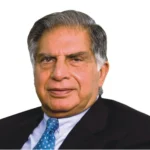




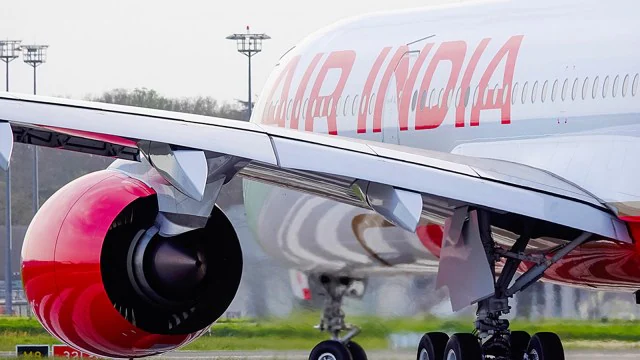

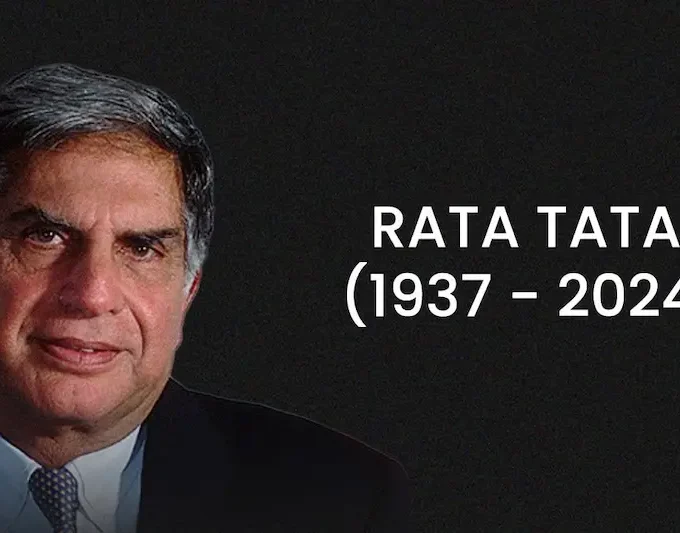
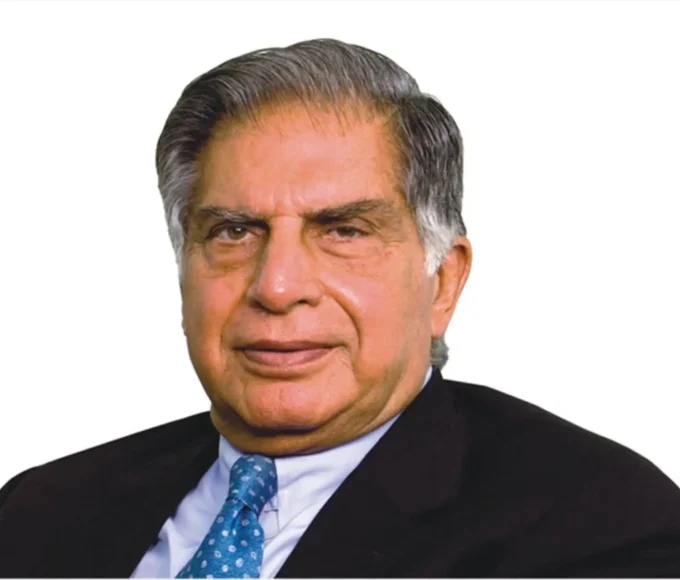
Leave a comment